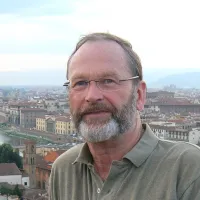William Rees is a human ecologist, ecological economist, Professor Emeritus and former Director of the University of British Columbia’s School of Community and Regional Planning in Vancouver, Canada, where his research and teaching focused on the biophysical prerequisites for sustainability in an era of accelerating ecological change. Within this envelope developed a special interest in ecologically-relevant metrics of sustainability and their interpretation in terms of complexity theory and behavioural ecology. Prof Rees is perhaps best known in ecological economics as the originator and co-developer of ‘ecological footprint analysis’. His book on eco-footprinting, with then PhD Candidate Dr Mathis Wackernagel, has been translated into eight languages including Chinese. Widely adopted for sustainability assessments by Governments, NGOs and academics, the human ‘eco-footprint’ has arguably become world’s best-known sustainability indicator. Prof Rees’ most recent writing focuses on neuro-biological, cognitive and cultural barriers to sustainability, including human’s well-developed capacity for self-delusion. He has authored (or co-authored) more than 150 peer reviewed papers and book chapters, and numerous popular articles on humanity’s (un)sustainability conundrum. Active across disciplines, Dr Rees is a long-term member of the Global Ecological Integrity Group, a Fellow of the Post-Carbon Institute, a founding member and past President of the Canadian Society for Ecological Economics and founding Director of the OneEarth Initiative. The influence of Dr Rees’ work is widely recognized and awarded. He has lectured by invitation throughout North America and 25 other countries around the world; the Vancouver Sun named Prof Rees one of British Columbia’s top public intellectuals in 2000; in 2006 he was elected to the Royal Society of Canada and in 2007 he was awarded a prestigious Trudeau Foundation Fellowship. Laval University in Québec recognized Prof Rees with an honorary doctorate in 2012, and he is the recipient of both the 2012 Boulding Prize in Ecological Economics and a 2012 Blue Planet Prize (jointly with Dr Wackernagel).
Major Areas of Expertise in Sustainability Planning 1) Human bio-ecology and the ecological basis of civilization Modern techno-industrial society is a product of the ‘enlightenment project’ and is deeply rooted in what philosophers refer to as ‘Cartesian dualism.’ This perspective sees humans as somehow separate from the biophysical world, assumes we are masters of nature and enables us to act as if society is not subject to serious ecological constraints. Dualism, and its companion expansionary-materialist worldview, are arguably the major source of many of the so-called ‘environmental problems’ confronting humankind today. Much of my work, by contrast, adopts a bio-ecological perspective that recognizes that humans are part of nature (in fact, we are the dominant consumer organism in all major ecosystems on the planet), that we cannot assert effective control over critical ecosystems and that the future development of civilization is seriously constrained by natural limits. My research on the means for achieving sustainability therefore leads to policies and planning that is cognitive of potentially dangerous biophysical trends. My approach argues for managing human demand rather than resources. Most relevant course: PLAN 504 Other closely related courses in SCARP: PLAN 596, PLAN 548Y Other closely related courses at UBC: 2) Ecological economics: Biophysical realities in resource allocation and distribution Mainstream neo-liberal economic theory is rooted in concepts borrowed from Newtonian analytic mechanics. This paradigm fosters the development of simple, reductionist, linear, deterministic, single equilibrium-oriented models that are highly abstracted from biophysical reality. Conventional economists also tend to see the human economy as a distinctly separate system, all but independent of the ecosphere. This frees the discipline to emphasize efficiency and continuous economic growth. By contrast, the emerging ecological economic perspective is derived from political science, ecology, far-from-equilibrium thermodynamics and complex systems theory. Its models are characterized by real-world complexity, including non-linear behaviour (surprise) and multiple equilibria. From their more holistic perspective, ecological economists see the economy as a dependent, growing, fully-contained sub-system of a non-growing finite ecosphere. Ecological economics therefore emphasizes steady state dynamics, biophysical limits and social equity. My major contribution in this domain is the development of ‘ecological footprint analysis’ (EFA), a quantitative tool based on energy and material flows that estimates the area of productive ecosystems required to sustain any specified human population or economic activity. EFA has done much to re-open the debate on human carrying capacity—we’d need four additional Earth-like planets to raise just the present world population to North American levels of consumption—and suggests novel interpretations of key planning ideas such as what constitutes ‘urban’ land. Most relevant course: PLAN 596 Other closely related courses in SCARP: PLAN 504, PLAN 548Y Other closely related courses at UBC: 3) Global change and the dynamics of societal collapse In 1995, anthropologist Joseph Tainter wrote: “what is perhaps most intriguing in the evolution of human societies is the regularity with which the pattern of increasing complexity is interrupted by collapse…” Ominously, modern, complex global techno-industrial society exhibits many symptoms similar to those that heralded previous societal collapses. More ominous still, contemporary decision-making processes seem incapable of responding creatively to the gathering evidence of potential crisis. While science is advancing a coherent understanding of the proximal conditions and mechanisms that precipitate collapse, I am most interested in the ‘distal’ factors that drive human societies to expand and complexify to the point where implosion seems inevitable. Is the cycle of human society similar to the “never-ending adaptive cycles of growth, accumulation, restructuring [collapse] and renewal” that we find in nature? Most important, is our more knowledge-intensive modern society capable of breaking free of the cycle of collapse that characterized earlier civilizations?
